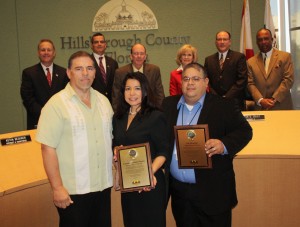Commissioner Murman quoted in this Tribune article on Economic Prosperity Committee:
Economic panel’s makeup criticized
By MIKE SALINERO | The Tampa Tribune
Published: April 04, 2012 Updated: April 04, 2012 – 12:00 AM
TAMPA —
A new Hillsborough County economic development committee is being criticized because its membership is heavily weighted toward development interests.
Citizen activists say they will attend today’s County Commission meeting to protest the composition of the Economic Prosperity Stakeholder Committee. The activists worry that a developer-friendly committee will want to strip away development regulations that protect taxpayers, neighborhoods and the environment.
Of the 19 people already appointed to the committee, two are county commissioners and 14 are developers, land-use lawyers, real estate brokers, civil engineers or professionals in other development-related fields.
Commissioners will make the final two appointments to the 21-member committee today. The three candidates for those two slots are a land-use lawyer and two civil engineers. That means the final committee makeup will have 16 members in development-related fields.
“I think the name of the committee — economic prosperity — suggests that a broad base of economic interests would be brought to the table,” said Mariella Smith, a Sierra Club member who was appointed to one of two committee seats allotted to environmental groups.
“But when you look at makeup of the committee,” Smith said, “you see that the focus is on enhancing the economic prosperity of one specific industry — development.”
According to its mission statement, the committee is to examine the county’s regulatory structure and make recommendations on how to ease the burden on businesses.
At the same time, the recommendations should not undermine the county’s commitment to quality of life and environmental stewardship, the statement says. It does not point to a specific industry.
Commissioner Sandy Murman, who will chair the committee, said she wants the members to make recommendations on transportation, infrastructure and other building blocks of economic prosperity.
Murman said she is happy with the committee membership, including her appointee, Richard Harcrow, an executive with Newland Communities, developer of FishHawk Ranch and other planned communities.
“I feel like in order to move this vision forward, we have to have developers at the table,” Murman said. “They’re not going to be sitting there so they can propose this and that to help themselves. They’re going to be providing a vision of what we want our area to be.”
Some critics of the committee membership blame developers for the housing bubble of the early 2000s; the bursting of that bubble is generally viewed as one of the main factors behind the recession. The county should be trying to find ways to diversify its economy, they say, and lessen its dependence on home-building.
“They should be looking to make other industries part of our economic engine,” said George Niemann, a member of the grass-roots group United Citizens’ Action Committee. “Instead they’re focusing on building more homes that no one wants.”
Niemann said he thinks developers and land-use lawyers on the committee will come back with recommendations to reduce the impact fees they pay and to strip county land-use codes of regulations that protect residents.
The result will be more development sprawling into rural areas with taxpayers footing the bills for sewer, water, roads and schools, he said.
But Dan Malloy, the committee representative from the Tampa Bay Builders Association, said Niemann’s theory is faulty on several counts.
For one, Malloy said, most of the committee appointees he knows have the public’s best interest at heart. Plus, the committee meetings will be open to the public and the county commission will have the final say.
Ultimately, Malloy said, whatever regulatory changes the committee recommends will have little effect on speeding up the building permitting process.
“You can change things in the books and ultimately it’s not going to have any effect if there’s a delay on ruling on things,” Malloy said. “You have to change the culture of the organization.”

